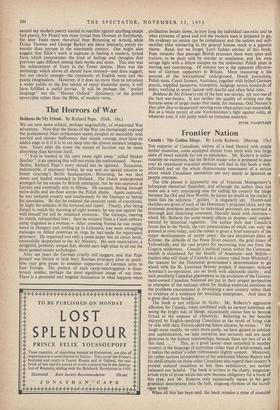The Horrors of War
Boldness Be My Friend. By Richard Pape. (Elek. 16s.)
WE are now more critical, perhaps ungratefully, of unadorned War adventure. Now that the bones of the War are increasingly exposed the professional Nazi ruthlessness seems mingled so incredibly with morbid and sinister buffoonery that simple courage must have an added edge to it if it is to cut deep into the almost satiated imagina- tion. Years after the event the nature of heroism can be more absorbing than heroism itself.
"'You're wanted in the crew room right away,' yelled Stinker Sinclair" is an opening that will not excite the sophisticated. Never- theless, Richard Pape's story should not be ignored. Tenacious, indomitable, if necessary brutal, he was sent on special mission to bomb Goering's Berlin headquarters. Returning, he was shot down and landed wounded in Holland. The Dutch underground arranged for his escape by British submarine, but he was captured at Leyden and eventually sent to Silesia. He escaped, fleeing through snow-drifts and ice-floes across the Polish plains. Again captured, he was tortured crudely and loathsomely by the Gestapo to betray his 'associates. By day he endured the constant rattle of executions, by night the screams of the tortured and raped. Finally, after being forced to watch the shooting of eight women, he was put against the wall himself but still he remained obdurate. The Gestapo, meeting its match, relinquished him ; then he escaped from a Czech military camp disguised as a woman... After crossing Vienna he was recap- tured in Hungary and, ending up in Lithuania, was soon smuggling messages to Allied countries in rings he had made for repatriated prisoners. He organised not only a camp paper but an entire book, successfully despatched to the Air Ministry. His own repatriation, a delightful, probably unique feat, should earn high place in all but the most genteel escape anthologies.
After ten years the German cruelty still staggers, and that Pape himself was forced to help bury Russian prisoners alive in quick- lime may give pause to amateur supporters of German aims in East Europe. The pattern of each camp-interrogation is disas- trously similar, perhaps the most significant image of our time. There is a perennial and singular fascination in what happens when , civilisation breaks down, in how long the individual can exist and to what extremes of good and evil the modern man is prepared to go. On evidence no nation can be complacent and the sadism and self- sacrifice alike simmering in the general human stock is a gigantic theme. Read, lest we forget, Lord Tedder advises of this book. Pape remarks that amongst British prisoners there were spies and traitors, to be dealt with by murder or mutilation, and his own savage fight with a fellow escapee on the midwinter Polish plain is moving and convincing. Of interest too is the apparent effective- ness of • German supporters in Britain. More reassuring is his account of the international underground. Dutch journalists, Polish nuns, Czech farmers, Austrians, together with bribed German guards, supplied passports, transports, lodgings across hundreds of miles, working in secret liaison with fearful and often fatal risks.
Boldness Be My Friend is one of the best war-stories, yet not one of the best war-books. It has neither the quality of writing nor the humane sense of larger issues that made, for instance, Odd Nansen's Day after Day so desperately moving even when action was suspended. But as a blunt record of one Yorkshireman's fight against odds, at whatever cost, it will justly reach an immense audience.
PETER VANSITTART
































 Previous page
Previous page